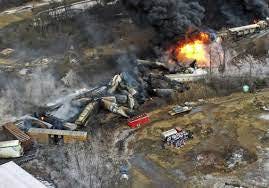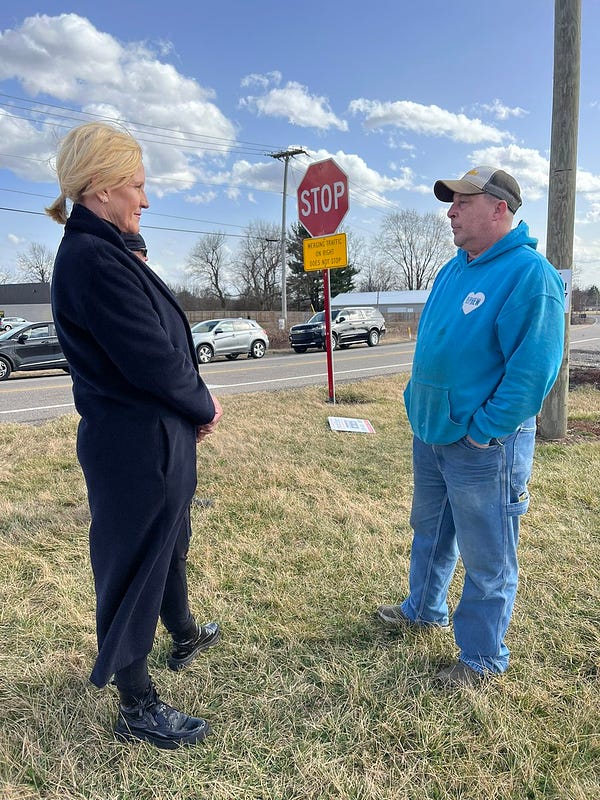Why the Poor Stay Poor in America - Ohio's Toxic Train Derailment
Welcome to Crime and Punishment: Why the Poor Stay Poor in America. I’m thrilled that you signed up to read my newsletter, and I hope that together, we can make a difference.
“Three weeks after the toxic train derailment in Ohio, an independent analysis of Environmental Protection Agency data has found nine air pollutants at levels that, if they persist, could raise long-term health concerns in and around East Palestine…The analysis by Texas A&M University researchers stands in contrast to statements by state and federal regulators that air near the crash site is completely safe, despite residents complaining about rashes, breathing problems and other health effects.” The Washington Post, February 24, 2023 East Palestine, Ohio, a small town of about 5,000 residents, is a stone’s throw from the Pennsylvania border, and a three hour drive north and east from the capital city of Columbus. The recent train derailment and subsequent release of hazardous materials into the areas’ land, water and air has made national news for several weeks, and for good reason—this type of accident can happen practically anywhere, and for this community and surrounding area, it will have a decades-long impact. By the way, I’m referring to the train derailment as an “accident” for lack of a more accurate description. When the director of the National Transportation Safety Board (NTSB) announced its preliminary findings from an investigation of the derailment, she stated, and I’m paraphrasing, that it was no accident and completely preventable…but neither she nor the report explained what could have prevented it, at least not yet. Putting aside other types of environmental disasters, like oil and gas pipeline leaks, oil rig explosions, groundwater and drinking water contamination from various manufacturing sources and the occasional nuclear power plant meltdown, train derailments with hazardous material spills don’t rank especially high on the list in frequency. According to the Association of American Railroads, trains transported 2.2 million carloads of chemicals in 2021 alone, and the vast majority, 99.9%, reached its destination without incident (specifically, this means without a release of chemicals caused by a train accident). But even if that is an accurate assessment, the remaining number, depending on how it’s calculated, is somewhere close to 80 incidents across all modes of transportation of hazardous materials in a single year. And if it’s your town or state plagued by decades of health problems and testing, remediation and monitoring activities, it will upend your life and thousands of others, as the people of East Palestine have learned.
Because I live in Ohio and practiced environmental law for one of the state agencies involved in the remediation efforts at East Palestine, I’ve paid particularly close attention to the responses of the various government officials and agencies. I’ve read the analyses of journalists, environmental scientists, professors and others who have tried to make sense of this accident from an outsider’s perspective. Although none of us know how this sudden, hazardous materials release will eventually play out, according to NBC News, it might help to look at past, similar accidents to access the short and long-term impacts on the East Palestine community. Over 40 years ago in September 1982, there was a train derailment in Livingston, Louisiana, that shares many similarities to the East Palestine accident—the Livingston derailment included a significant release of vinyl chloride, and emergency responders also chose to do a “controlled release” and burn off of that chemical to avoid a more dangerous and likely explosion. And the train cars that derailed in both Livingston and East Palestine were carrying ethylene glycol, known to cause “a sore throat and nausea at high concentrations”. Livingston’s resident’s immediately complained of symptoms extremely similar to the people of East Palestine 40 years later: headaches, sore throats, nosebleeds, nausea, skin rashes, dizziness and respiratory flare-ups of bronchitis and asthma (the cancer diagnoses come years later). It shocked me that both government officials and local doctors in East Palestine seemed reluctant to connect the sudden onset of these symptoms with exposure to hazardous chemicals—from what I have read, and experienced talking with citizens when working at the Ohio EPA, these same symptoms have been recorded by regulatory agencies and medical professionals for over half a century. Even with exposure to vastly different chemicals, like Hexavalent Chromium in the groundwater and drinking water of Hinkley, California, for example, many of these symptoms overlap. It seems that in the last few days, though, more doctors have seen a number of patients with similar symptoms and are beginning to connect the dots. But perhaps the most important similarity of these two toxic spills (and thousands of others) is the fear. Residents are afraid to drink their own tap water, afraid to breathe the air, afraid to plant their spring vegetable gardens or let their dogs out in their own backyards. Yes, overall there are fewer train derailments than 40 years ago, particularly with trains carrying hazardous materials, but today there also are more hazardous materials being transported and for longer distances.¹ And there is still no quick fix for a massive hazardous materials release. The Livingston, Louisiana remediation and water monitoring continued for 30 years—it is a long and costly process and the locals lose not only their way of life, but their precious time. That’s what Erin Brockovich, a 30 year environmental activist, said at the overflowing town hall she hosted in East Palestine on a Friday evening, just about three weeks after the train derailment. She also spent a day or two before the town hall, speaking individually with residents, and urging them to band together, ask questions and push for answers. “This is going to be a long game,” she said to the crowd.  .@keithricheal074 lives 5 blocks from the derailment in #EastPalenstine and he says local police knocked on his door the night of the derailment to warn them. He says he’s worried about what will happen to his dogs months from now if they go outside and eat the grass. If you’re interested in learning more about this train derailment and hazardous materials release, and what information and data the various agencies involved have produced to date and will produce in the future, I’ve provided a few resources below: — First is the U.S. Environmental Protection Agency (USEPA) website section devoted to the East Palestine derailment. It seems to be extremely comprehensive and forthcoming, especially when you access the various links it provides to separate documents and testing data. Here are two documents accessible from this site I think are particularly important:
For those who live in the area, or for others keeping track of the remediation efforts, it is important to know where the monitoring and testing are taking place. — A copy of the National Transportation Safety Board (NTSB) Preliminary Report on the East Palestine train derailment issued on February 23, 2023. It briefly explains what the Board has examined so far and what remains for them to investigate. — Finally, statistics compiled by Opensecrets.org detailing the amount of money spent by the major players in the railroad industry on federal lobbying efforts. The total for 2022 was $24,634,162. Norfolk Southern ranked fourth in lobbying money spent out of 53 clients listed for 2022, spending $1,800,000. ——————————————————————————— I’d love to hear your thoughts on this recent environmental accident. Have you been following the developments? Where are you getting your information? Does this post provide helpful information for you? Please let me know in the Comment Section below. I’m thrilled to welcome all of our new subscribers! Crime and Punishment has had a flurry of signups since the beginning of the new year, and I extend a hearty and grateful welcome to each of you. Your support means everything to me! I have lots of ideas bolstered with new research, a podcast expansion and some special guests in the works, so stay tuned… As always, I appreciate your interest and thoughtful ideas that make our Crime and Punishment community a welcoming space to visit and chat. There’s no time like the present to become a free or paid subscriber…and there’s no time like the New Year to Upgrade your free subscription to paid — it’s easy, and will allow me to continue and expand Crime and Punishment. Thanks in advance for your support! You’re on the free list for Crime and Punishment: Why the Poor Stay Poor In America. All posts are free for now, but if you’d like to get ahead of the crowd, feel free to support my work by becoming a paid subscriber. | ||||||||||||||||||||||||||||||||||||||||||||||||||||||
Older messages
Ending the Covid-19 Public Health Emergency
Sunday, February 19, 2023
It's More Than Just A Declaration
How Big Corporations Keep Us Poor...
Friday, February 10, 2023
Listen now (13 min) |
Weekday Reads: Why Scientists Battle To Understand The Natural World
Tuesday, January 31, 2023
And What They're Learning
White Collar Crime
Wednesday, January 25, 2023
Listen now (10 min) | It Costs Us Way More In dollars Than Street Crime But Few Know Its Reach
Critical Thinking
Friday, January 20, 2023
Listen now (11 min) | And The Part It Plays In Making Positive Change
You Might Also Like
5-Bullet Friday — How to Choose Peace of Mind Over Productivity, Guinean Beats for Winding Down, Lessons from Legendary Coach Raveling, and a New Chapter from THE NO BOOK
Saturday, March 1, 2025
"Easy, relaxed, breathing always leads to surprise: at how centred we already are, how unhurried we are underneath it all." — David Whyte ͏ ͏ ͏ ͏ ͏ ͏ ͏ ͏ ͏ ͏ ͏ ͏ ͏ ͏ ͏ ͏ ͏ ͏ ͏ ͏ ͏ ͏ ͏ ͏ ͏ ͏ ͏
Nicole Kidman's “Butter Biscuit” Hair Transformation Is A Perfect Color Refresh
Saturday, March 1, 2025
Just in time for spring. The Zoe Report Daily The Zoe Report 2.28.2025 Nicole Kidman's “Butter Biscuit” Hair Transformation Is A Perfect Color Refresh (Celebrity) Nicole Kidman's “Butter
David Beckham's Lifestyle Keeps Him Shredded at 50
Friday, February 28, 2025
View in Browser Men's Health SHOP MVP EXCLUSIVES SUBSCRIBE David Beckham's Lifestyle Keeps Him Shredded at 50 David Beckham's Lifestyle Keeps Him Shredded at 50 The soccer legend opens up
7 Home Upgrades That Require Zero Tools
Friday, February 28, 2025
Skype Is Dead. There are plenty of ways to make quick improvements to your house without a single hammer or screwdriver. Not displaying correctly? View this newsletter online. TODAY'S FEATURED
Heidi Klum Matched Her Red Thong To Her Shoes Like A Total Pro
Friday, February 28, 2025
Plus, the benefits of "brain flossing," your daily horoscope, and more. Feb. 28, 2025 Bustle Daily Here's every zodiac sign's horoscope for March 2025. ASTROLOGY Here's Your March
How Trans Teens Are Dealing With Trump 2.0, in Their Words
Friday, February 28, 2025
Today in style, self, culture, and power. The Cut February 28, 2025 POWER How Trans Teens Are Dealing With Trump 2.0, in Their Words “Being called your correct name and pronouns can be the difference
The Eater Oscars for best bites in film this year
Friday, February 28, 2025
An NYC cafe garners celebrity support after rent hike
The Must-See Movies The Oscars Overlooked
Friday, February 28, 2025
Plus: Celebrities pay tribute to Michelle Trachtenberg. • Feb. 28, 2025 Up Next Your complete guide to industry-shaping entertainment news, exclusive interviews with A-list celebs, and what you should
The Best Cropped Jackets for Spring, Styled by Us
Friday, February 28, 2025
Plus: What we carried in our bags at Fashion Week. The Cut Shop February 28, 2025 Every product is independently selected by our editors. Things you buy through our links may earn us a commission.
The chicken and the eggs
Friday, February 28, 2025
and where they both come from ͏ ͏ ͏ ͏ ͏ ͏ ͏ ͏ ͏ ͏ ͏ ͏ ͏ ͏ ͏ ͏ ͏ ͏ ͏ ͏ ͏ ͏ ͏ ͏ ͏ ͏ ͏ ͏ ͏ ͏ ͏ ͏ ͏ ͏ ͏ ͏ ͏ ͏ ͏ ͏ ͏ ͏ ͏ ͏ ͏ ͏ ͏ ͏ ͏ ͏ ͏ ͏ ͏ ͏ ͏ ͏ ͏ ͏ ͏ ͏ ͏ ͏ ͏ ͏ ͏ ͏ ͏ ͏ ͏ ͏ ͏ ͏ ͏ ͏ ͏ ͏ ͏ ͏ ͏ ͏ ͏ ͏ ͏ ͏ ͏ ͏



